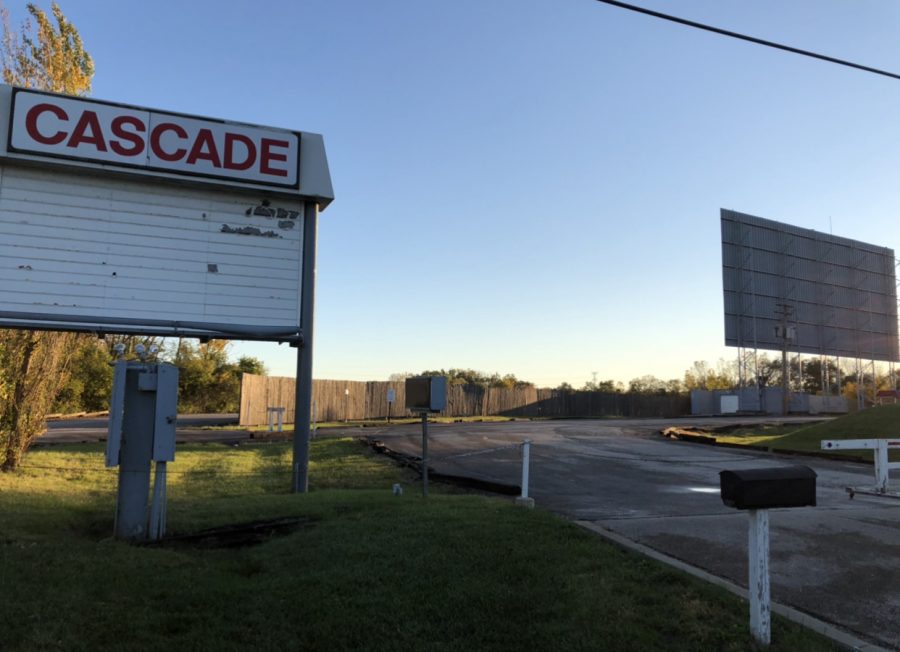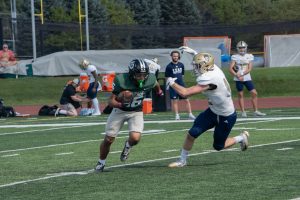Cascade Drive-in Fights Against Extinction
October 12, 2020
Many baby boomers recall metal speakers sitting on the car window that filled the enclosed space with scratchy movie audio, or packing friends in the trunk like sardines to see how many of you could get in for free.
The 1950s was the heyday for drive-in theaters with more than 4,000 drive-ins across the country. Drive-ins were popular for families because it allowed parents to relax, while their children had the freedom to run around. Movies like Grease and American Graffiti depict the stereotypical drive-in as a place for teenagers to get together, to be alone, and drink.
Stanford Kohlberg, who was early in the popularization of drive-in theaters, owned more than 50 drive-ins throughout Illinois, Indiana, Wisconsin and Michigan – including the currently closed Cascade Drive-in in West Chicago. Jeffery Kohlberg and his six sisters worked at the drive-ins growing up. From cutting the lawn to filling in for projectionists, Kohlberg has worked in the drive-in business his whole life.
Like Kohlberg, Don Dobrez Jr. grew up at the drive-in. Dobrez and his family frequented drive-in theaters because the admission was inexpensive for a double feature, and the children had the freedom to run around.
“There once was a double feature where the first movie was a Charlie Brown feature-length movie and the second movie was the Godfather,” said Dobrez. “My parents at intermission basically told everybody to put your heads down and go to sleep. Of course, I couldn’t because I’m a night owl and the only boy in the group. So, all of my sisters are basically sleeping, and I’m looking in between my parents’ chairs to see bits and pieces of the Godfather.”
Before retiring, Stanford decided to sell the chain to developers, who tore the theaters down. Developers looking for land to create residential housing is one of the biggest reasons why drive-in theaters close down. Kohlberg bought two drive-ins: the Keno Drive-in opened in 1949 Kenosha, Wis., and the Cascade Drive-in opened in 1961 West Chicago, Ill.
For his documentary about drive-ins in the Chicagoland area, Dobrez documented the end of the Hi-Lite Drive-in in Aurora. Although the community voted to keep it, the drive-in was shut down and demolished in 2006. According to Dobrez, “14 years later and it’s still an empty field.”
“What happens a lot with these drive-ins is the people who run the drive-in don’t own the land that the drive-in is on,” said Dobrez. “Then the people who own that land tend to sell it. The community tried to save it [Keno Drive-in]. They got voted down and then tore down and dismantled the big wooden screen.”
In 2015, the land Keno Drive-in was on was sold to developers and demolished to make new residential housing.
Kohlberg’s second drive-in, the Cascade Drive-in, shut down in 2019. The Kuhn family, the property owners of the Cascade Drive-in land, sold the property and surrounding areas, which forced Cascade to stop operation. Kohlberg sold all of the equipment, materials and merchandise before shutting down entirely.
Many community members were sad Cascade closed, especially since drive-ins are rare now. There are only 325 drive-in theaters left in the country. With Cascade shutting down, the McHenry Drive-in is the only remaining drive-in in the Chicagoland area.
Daily Herald film critic, Dann Gire, compares the owners of “hard tops” or an indoor movie theater to the owners of drive-ins. Unlike the chain corporations that typically run movie theaters, “drive-ins tend to be operated by characters. The people who take on drive-ins are not normal, in the best way. For instance, Scott Dehn.”
“He [Dehn] did something the Cascade couldn’t do, bought the property around the McHenry,” said Gire. “So, he is good to go for life. And he is committed, he views this thing as a community outreach program and he views himself –and I view him– as a guardian of the culture. As a result of that, he owns the land and he’s got the place so as long as he wants to have the thing running, we will have the McHenry. And maybe, the same piece of magic can befall upon the Cascade and it can do what the McHenry does. Have the land owned and operated by people who generally love the business and the community connection.”
Although the West Chicago community is sad about the loss of the Cascade Drive-in, the COVID-19 pandemic has created a resurgence for drive-ins. As social distancing and the coronavirus remain on everyone’s mind, the big, white drive-in screen that still stands at the old Cascade property has become a beacon for movie fans hungering for buttery popcorn and a safe, big screen entertainment option.
Wood Dale resident and drive-in supporter, Roy Larsen, recalls one of his last memories at Cascade. Larsen said, “The last thing I saw there was one of the Avengers movies. It’s a nice place and it’s one of the last of it’s kind. To see that go, it’s really hard.”
For years Dobrez and his sisters would meet at Cascade for inexpensive summer entertainment. Dobrez said, “We’re all going from different directions and then we’re setting up camp. Somebody gets there first, they secure the next two places, people pull up, and suddenly it’s like this mini-family reunion. We did it for years, to all of my nieces and nephews when they were little kids this is one of the fundamental experiences they had every summer was us going to the drive-in.”
The City of West Chicago will host a public hearing to determine if the zoning is appropriate for the Cascade Drive-in. The hearing was originally scheduled for Oct. 6th, but has been postponed until a later date in Nov.
Letters of support can be sent to city planner [email protected]




















